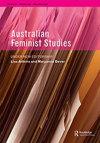错位的地方,颠覆的女权主义(或:一个移民定居者对立足之地的追求)
IF 1.5
4区 社会学
Q2 WOMENS STUDIES
引用次数: 0
摘要
摘要地点构成了我们个人政治成就的物质基础,继Adrienne Rich和Audre Lorde之后的女权主义理论表明,理解我们各自的位置是如何朝着有意义的理论和实践迈出关键一步的。这种地方政治和伦理是在女权主义的环境人文学科中培养起来的,包括对生态正义的渴望,将人类与非人类世界的伦理关系直接纳入女权主义的范围。这篇文章源于这样一种观察,即认真对待土著和白人定居者关系的地方工作可以通过更实质性地参与许多其他定居者的经历来丰富。在这里,我填补了这一空白:我探索了南亚中产阶级移民定居家庭的个人叙事,利用这种经历所带来的具有无地性的矛盾场所,进一步激发了对环境人文中场所和女权主义的理解。在这样做的过程中,我建议“女权主义”和“场所”作为理解的范畴,不必是静态的、稳定的或单一的,以确定我们的身份、激情或政治——即使与这些范畴的联系是不稳定和脆弱的,这种位移及其过度也可能是基础。本文章由计算机程序翻译,如有差异,请以英文原文为准。
Displacing Place, Unstating Feminism (or: One Migrant Settler’s Quest for a Standing Place)
ABSTRACT Place forms the material grounds of our personal-political becomings, and feminist theory after Adrienne Rich and Audre Lorde demonstrates how understanding our respective locatedness forms a critical step towards meaningful theory and praxis. Such politics and ethics of place are cultivated in the feminist environmental humanities to encompass desires for ecological justice, putting human ethical relationships with the non-human world squarely into feminism’s scope. This article arises from the observation that place-work taking Indigenous and white settler relationships to place seriously could be enriched by more substantively involving many other settler experiences. Here, I enflesh this gap: I explore personal narratives of middle-class South Asian migrant settlerhood, using the paradoxical place-with-placelessness this experience entails to further vitalise understandings of place and feminism in the environmental humanities. In doing so, I propose that ‘feminism’ and ‘place’, as categories of understanding, need not be static, stable or singular to orient our identities, passions, or politics – that even when connections to these categories are unstable and tenuous, that very displacement and its excess can be grounding.
求助全文
通过发布文献求助,成功后即可免费获取论文全文。
去求助
来源期刊

Australian Feminist Studies
WOMENS STUDIES-
CiteScore
2.50
自引率
0.00%
发文量
7
期刊介绍:
Australian Feminist Studies was launched in the summer of 1985 by the Research Centre for Women"s Studies at the University of Adelaide. During the subsequent two decades it has become a leading journal of feminist studies. As an international, peer-reviewed journal, Australian Feminist Studies is proud to sustain a clear political commitment to feminist teaching, research and scholarship. The journal publishes articles of the highest calibre from all around the world, that contribute to current developments and issues across a spectrum of feminisms.
 求助内容:
求助内容: 应助结果提醒方式:
应助结果提醒方式:


